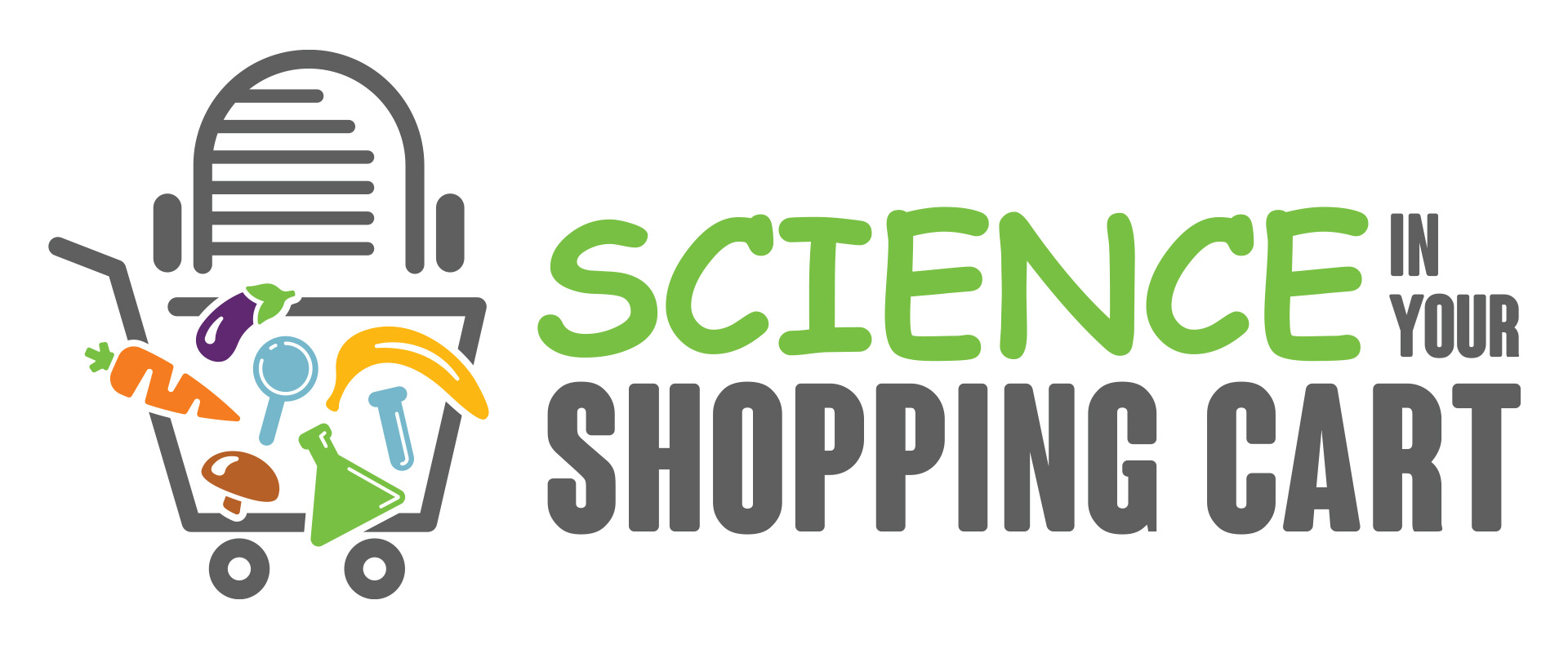Science in Your Shopping Cart - The Podcast
Listen now on: Apple Podcasts, iHeart Radio, Spotify, YouTube, and more.
Did you know the popular Roma tomato was actually developed by ARS scientists in Beltsville, MD? Or that ARS technology has helped reduce the use of pesticides on apples and other fruits? Or that ARS researchers are turning waste after harvest into fuels and other products? Check out our new podcast series, Science in Your Shopping Cart, and learn how science touches many of the products we buy at the grocery store, from new varieties of fruits and vegetables to technological advances that make our food safer, cheaper, and tastier.
Listen to the Latest Podcast
We are going back in time with Science in Your Shopping Cart! Each week, we’ll be serving up a fresh helping of classic episodes, handpicked around fun themes—this month’s theme? Summertime Foods
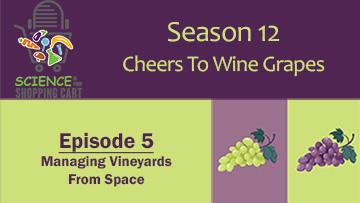
Season 12: Cheers to Wine Grapes
Episode 5: Managing Vineyards From Space
ARS researcher Bill Kustas, a Research Hydrologist and Distinguished Senior Research Scientist at ARS’s Hydrology and Remote Sensing Laboratory in Beltsville, MD, is part of a collaborative team called GRAPEX. The GRAPEX research program involves using satellites and even unoccupied aerial vehicles to identify vine water use and stress throughout a vineyard. Growers can use these data to determine if certain areas are getting too much, too little, or just the right amount of irrigated water.
Listen now on: Apple Podcasts, iHeart Radio, Spotify, YouTube, mp3, and more.
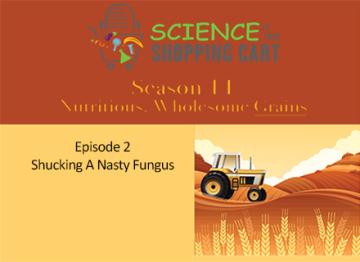
Season 11: Wholesome, Nutritious Grains
Episode 2: Shucking A Nasty Fungus
Corn is grown all over our planet and is an important crop in all parts of our lives. ARS Research Entomologist Xinzhi Ni, at ARS’s Crop Genetics and Breeding Research Unit in Tifton, GA, is looking at how corn plants get stressed, and how those stressors invite diseases and pathogens to proliferate inside the crop. Ni is hopeful the work will help future entomologists and breeders find solutions to these perennial problems.
Listen now on: Apple Podcasts, iHeart Radio, Spotify, YouTube, mp3, and more.
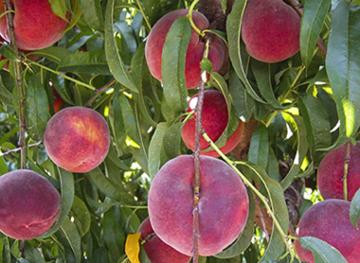
Season 9: Healthier & Tastier
Episode 3: These Peaches are a Real Joy
We travel to Byron, Georgia, to the ARS Fruit and Tree Nut Research Unit, and visit with Research Horticulturist Chunxian Chen. Dr. Chen and his group recently released three new peach cultivars: Rich Joy, Crimson Joy, and Liberty Joy.
Listen now on: Apple Podcasts, iHeart Radio, Spotify, YouTube, mp3, and more.
Read more:
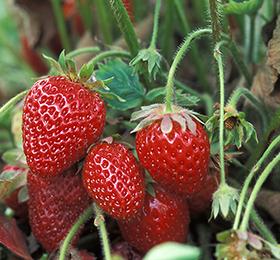
Season 4: Berries
Episode 4: Strawberries
Check out the 'Keepsake' strawberry which resulted from research efforts to develop strawberries with improved shelf life and learn how new strawberry cultivars are created.
Listen now on: Apple Podcasts, iHeart Radio, Spotify, YouTube, and more.
Read more:
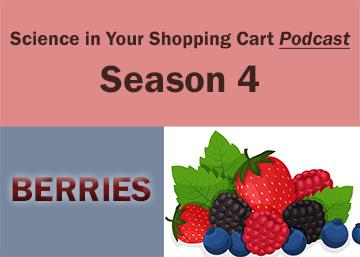
Season 4: Berries
Episode 1: Blueberries
Learn how a USDA breeding program was responsible for the development of the blueberry growing industry in the southeastern United States and how ARS scientists have developed and are continuing to work with farmers to create new cultivars of blueberries that we all get to enjoy.
Listen now on: Apple Podcasts, iHeart Radio, Spotify, YouTube, and more.
Read more:

Season 1: Spinach, Tomatoes, & Potatoes
Episode 1: Tomatoes
Where was the Roma tomato developed? Rome? Nope, the answer may surprise you. Learn this and more interesting facts about the Roma tomato.
Listen now on: Apple Podcasts, iHeart Radio, Spotify, YouTube, and more.
Read more:
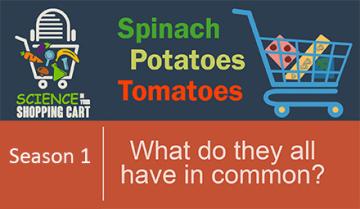
Season 1: Spinach, Tomatoes and Potatoes: What Do They All Have in Common?
We know that all three are vegetables, or two vegetables and a fruit if you will, but would you be surprised to find out that ARS researchers developed its own varieties of tomatoes, potatoes, and spinach?
Take a virtual trip with us to Italy, Idaho, and California and learn about the Roma tomato, red spinach and Huckleberry Gold potato.
Listen now on: (14 min. 18 sec.) Apple Podcasts, iHeart Radio, Spotify, YouTube, mp3, and more.
Don't have time to listen to the entire podcast? Explore the individual segments below.

Season 1: Spinach, Tomatoes, & Potatoes
Episode 1: Tomatoes
Where was the Roma tomato developed? Rome? Nope, the answer may surprise you. Learn this and more interesting facts about the Roma tomato.
Listen now on: Apple Podcasts, iHeart Radio, Spotify, YouTube, and more.
Read more:
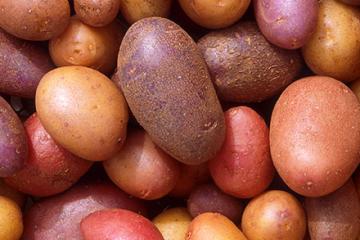
Season 1: Spinach, Tomatoes, & Potatoes
Episode 2: Potatoes
"I'm your huckleberry." Learn about the origins of the Huckleberry Gold potato and other interesting facts about potatoes.
Listen now on: Apple Podcasts, iHeart Radio, Spotify, YouTube, and more.
Read more:
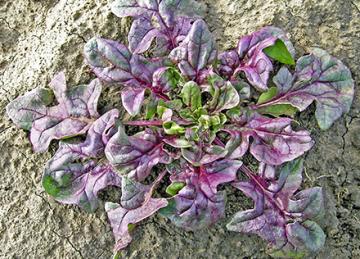
Season 1: Spinach, Tomatoes, & Potatoes
Episode 3: Spinach
Making Popeye proud. ARS recently released the world's first true red spinach, called USDA Red. Learn about the benefits this new powerful vegetable provides to consumers.
Listen now on: Apple Podcasts, iHeart Radio, Spotify, YouTube, and more.
Read more:
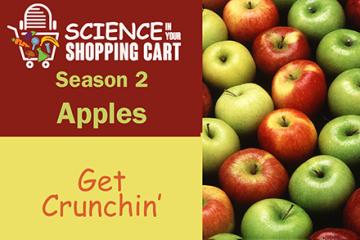
Season 2: Apples: Get Crunchin'
Apples are as American as apple pie. Let's look at some cool innovations and research that ARS scientists are conducting to ensure those apples in your shopping cart are fresh, tasty, cost-friendly, and high quality.
Listen now on: (29 min. 25 sec.) Apple Podcasts, iHeart Radio, Spotify, YouTube, mp3, and more.
Don't have time to listen to the entire podcast? Explore the individual segments below.
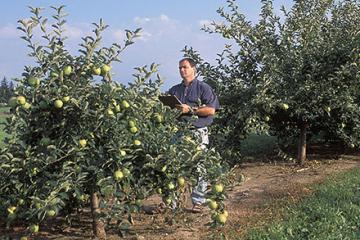
Season 2: Apples: Get Crunchin'
Episode 1: Apple Rootstocks
Did you know that the apple you're eating right now probably came from a rootstock developed by ARS? Our scientists are breeding new rootstocks that are more resistant to pests and diseases, that bear more delicious fruit, and are more ideal for apple growers to pick and prune.
Listen now on: Apple Podcasts, iHeart Radio, Spotify, YouTube, and more.
Read more:
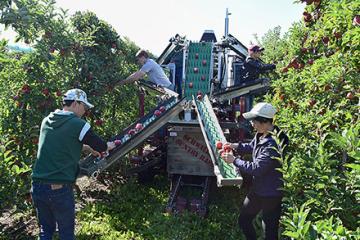
Season 2: Apples: Get Crunchin'
Episode 2: Apple Sorting Machine
ARS researchers have developed an in-field apple sorting machine that not only improves apple picking efficiency, but also scans and grades apples. Think of it as a 21st century solution to apple picking and harvesting.
Listen now on: Apple Podcasts, iHeart Radio, Spotify, YouTube, and more.
Read more:
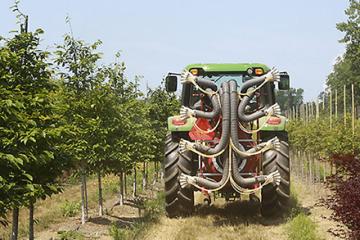
Season 2: Apples: Get Crunchin'
Episode 3: Precision Sprayer
ARS researchers have developed an in-field apple sorting machine that not only improves apple picking efficiency, but also scans and grades apples. Think of it as a 21st century solution to apple picking and harvesting.
Listen now on: Apple Podcasts, iHeart Radio, Spotify, YouTube, and more.
Read more:
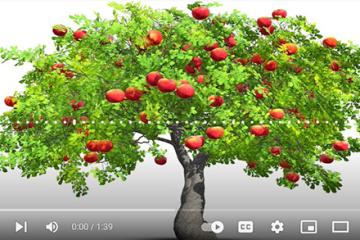
Season 2: Apples: Get Crunchin'
Episode 4: Snack Break
Ready for a snack break? Then sink your teeth into this apple trivia. You'll finally be able to answer the question, "What does a 200-year old apple tree and a train have in common?"
Listen now on: Apple Podcasts, iHeart Radio, Spotify, YouTube, and more.
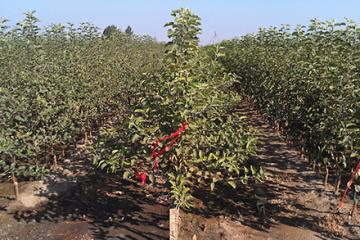
Season 2: Apples: Get Crunchin'
Episode 5: Mysterious Disease
Apple growers have a mystery on their hands. Something is killing popular dwarf apple trees, but researchers are unsure if the cause is environmental, viral, soil-based, or something else. ARS scientists are on the case!
Listen now on: Apple Podcasts, iHeart Radio, Spotify, YouTube, and more.
Read more:
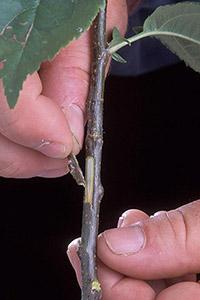
Season 2: Apples: Get Crunchin'
Episode 6: Rapid Breeding
The apple industry is a highly impactful business for the U.S. Growers are always looking for new varieties that are not only tasty but more resistant to disease outbreaks and environmental stressors that can severely reduce apple production. However, developing new varieties can take decades before they appear in your grocery market. ARS researchers have developed rapid breeding techniques to drastically speed up the process, bringing those new varieties of apples to your shopping cart much sooner than before.
Listen now on: Apple Podcasts, iHeart Radio, Spotify, YouTube, and more.
Read more:
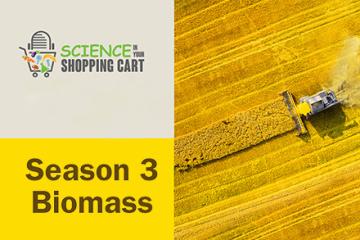
Season 3: Biomass
Learn about innovations and research that ARS scientists are conducting to turn farm waste, called biomass, into environmentally friendly products.
Listen now on: (19 min. 22 sec.) Apple Podcasts, iHeart Radio, Spotify, YouTube, mp3, and more.
Don't have time to listen to the entire podcast? Explore the individual segments below.
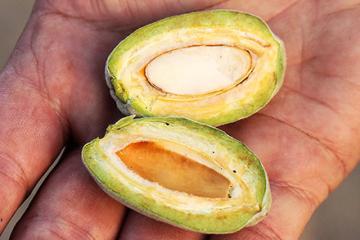
Season 3: Biomass
Episode 1: Pallets From Almond Shells
Learn about innovations and research that ARS scientists are conducting to turn farm waste, called biomass, into environmentally friendly products.
Did you know that ARS researchers in Albany, California, have created pallets out of biomass, specifically, discarded, low value almond and walnut shells? Listen to our podcast to learn more.
Listen now on: Apple Podcasts, iHeart Radio, Spotify, YouTube, and more.
Read more:
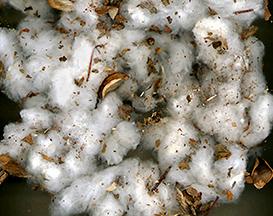
Season 3: Biomass
Episode 2: Polymers Out of Cotton Gin Trash
ARS is helping the environment by developing biodegradable plastics comprised of biomass, in this case cotton gin trash.
Read more:
Listen now on: Apple Podcasts, iHeart Radio, Spotify, YouTube, and more.
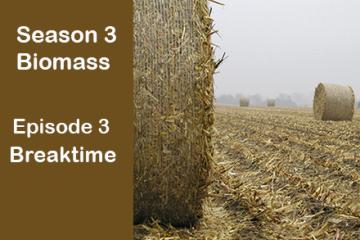
Season 3: Biomass
Episode 3: Breaktime
Before we get to our next biomass story, let's take a break and look at other ARS discoveries that could benefit our ecosystem.
Read more:
Listen now on: Apple Podcasts, iHeart Radio, Spotify, YouTube, and more.
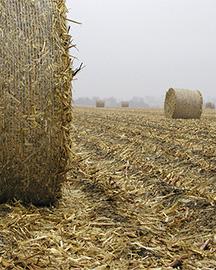
Season 3: Biomass
Episode 4: Bioproducts From Corn Waste
Corn is used to produce many products resulting in millions of pounds of waste but even byproducts of corn can be turned into bioproducts.
Read more:
Listen now on: Apple Podcasts, iHeart Radio, Spotify, YouTube, and more.
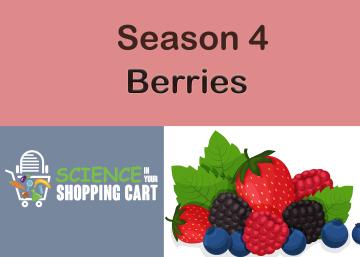
Season 4: Berries
Love eating berries? Berries are healthy and nutritional powerhouses that taste delicious whether fresh, frozen, dried, or processed. Did you know there is a very good chance that some of the berries you eat can be traced back to varieties developed by ARS scientists?
In this five part podcast series, "Berries", we'll explore four types of berries, "blueberries, blackberries, raspberries and strawberries" and ARS's role in developing new varieties.
Listen now on: (23 min. 43sec.) Apple Podcasts, iHeart Radio, Spotify, YouTube, mp3, and more.
Don't have time to listen to the entire podcast? Explore the individual segments below.
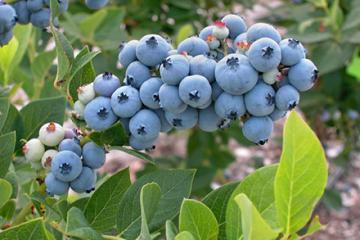
Season 4: Berries
Episode 1: Blueberries
Learn how a USDA breeding program was responsible for the development of the blueberry growing industry in the southeastern United States and how ARS scientists have developed and are continuing to work with farmers to create new cultivars of blueberries that we all get to enjoy.
Listen now on: Apple Podcasts, iHeart Radio, Spotify, YouTube, and more.
Read more:
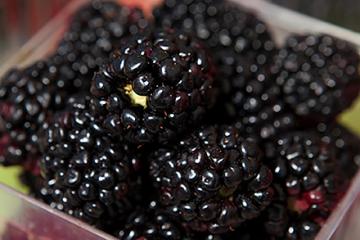
Season 4: Berries
Episode 2: Blackberries and Raspberries
ARS scientists created a thornless blackberry plant along with many new varieties of blackberries for the agricultural industry and a trellis system designed to protect and help pickers harvest blackberries. ARS scientists are also working with the individually quick-frozen industry to pack the great taste of raspberries into your cool treats.
Listen now on: Apple Podcasts, iHeart Radio, Spotify, YouTube, and more.
Read more:
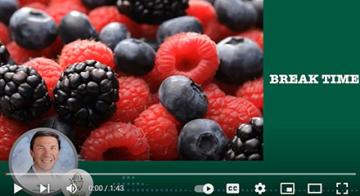
Season 4: Berries
Episode 3: Break Time
Thinking about growing berries at home? Check out the podcast to learn what types of nutritious, sweet-tasting berries you can plant in your own backyard.
Listen now on: Apple Podcasts, iHeart Radio, Spotify, YouTube, and more.
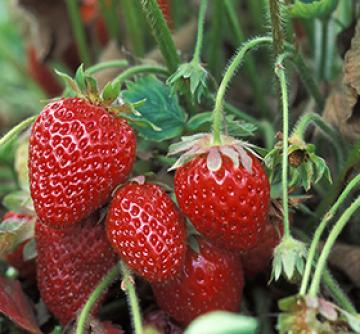
Strawberries growing on a vine
Season 4: Berries
Episode 4: Strawberries
Check out the 'Keepsake' strawberry which resulted from research efforts to develop strawberries with improved shelf life and learn how new strawberry cultivars are created.
Listen now on: Apple Podcasts, iHeart Radio, Spotify, YouTube, and more.
Read more:
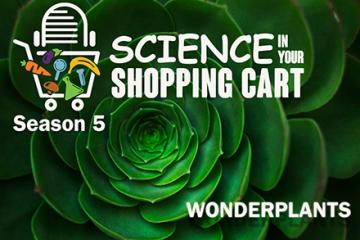
Season 5: Wonder Plants
In this season of Science in Your Shopping Cart we take a tour of some superhuman plants that we use in our everyday lives to help feed and protect us. Listen to all 7 episodes back-to-back.
Listen now on: (43 min. 37sec.) Apple Podcasts, iHeart Radio, Spotify, YouTube, mp3, and more.
Don't have time to listen to the entire podcast? Explore the individual segments below.

Season 5: Wonder Plants
Episode 1: U.S. National Arboretum
Check out some of these amazing wonder plants at the U.S. National Arboretum in Washington, DC.
Listen now on: Apple Podcasts, iHeart Radio, Spotify, YouTube, mp3, and more.
Read more:
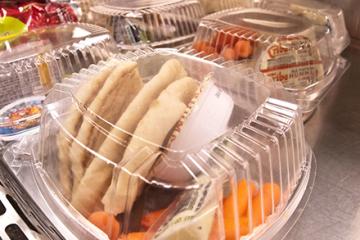
Season 5: Wonder Plants
Episode 2: One Time Use Containers
Plastic containers are everywhere. Products like toothpaste, shampoo, condiments, carryout containers, and even water nearly always come in packaging that we use once then throw away and can last hundreds of years in a landfill. ARS scientists are turning plant fibers in to single-use containers to one day replace non-biodegradable plastic containers.
Listen now on: Apple Podcasts, iHeart Radio, Spotify, YouTube, mp3, and more.
Read more:
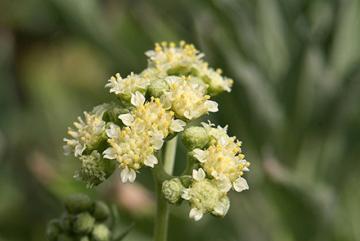
Season 5: Wonder Plants
Episode 3: Taking the Guayule Plant for a Test Drive
Rubber is a substance usually made from petroleum or from the Asian rubber tree plant. But rubber can also be produced from a plant called guayule. Learn about this amazing desert loving plant and how it's used in a 100% guayule tire!
Listen now on: Apple Podcasts, iHeart Radio, Spotify, YouTube, mp3, and more.
Read more:
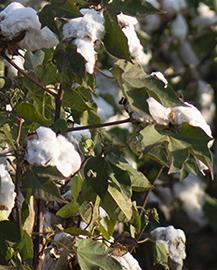
Season 5: Wonder Plants
Part 4: Super Cotton
ARS scientists are turning nano fibers from cotton plants into mask filters, wound dressings, and other medical applications.
Listen now on: Apple Podcasts, iHeart Radio, Spotify, YouTube, mp3, and more.
Read more:
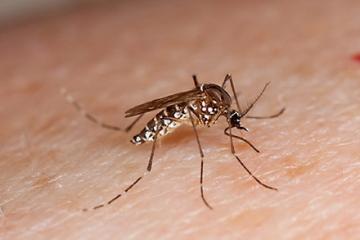
Season 5: Wonder Plants
Part 5: DYK Insect Repellants
Did you know that some wonderplants can be used to control and even kill annoying flies and mosquitoes?
Listen now on: Apple Podcasts, iHeart Radio, Spotify, YouTube, mp3, and more.
Read more:

Season 5: Wonder Plants
Part 6: From Shells to Cells
ARS scientists are coming up with new ways to produce clean energy by developing a large filter-type application out of discarded almond shells that could capture and then store hydrogen, as well as other components for energy purposes.
Listen now on: Apple Podcasts, iHeart Radio, Spotify, YouTube, mp3, and more.
Read more:
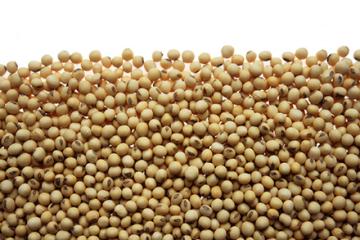
Season 5: Wonder Plants
Episode 7: Soybeans
This week we learn about another amazing Wonder Plant, soybeans! Did you know that soy has a wide array of uses, including non-food uses? Discover some of the newest uses of this amazing Wonder Plant.
Listen now on: Apple Podcasts, iHeart Radio, Spotify, YouTube, mp3, and more.
Read more:
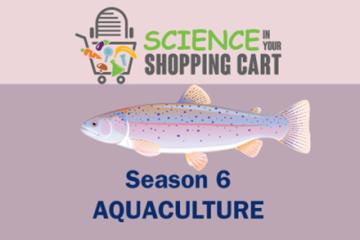
Season 6: Aquaculture
In this edition of Science in Your Shopping Cart, we take a deep dive in to seafood production in the U.S. Learn how research facilities across the country are developing new fish farming techniques, new strains of fish, are keeping fish healthy, and creating more sustainable methods for raising finfish and shellfish.
Listen now on: (50 min. 20 sec.) Apple Podcasts, iHeart Radio, Spotify, YouTube, mp3, and more.
Don't have time to listen to the entire podcast? Explore the individual segments below.
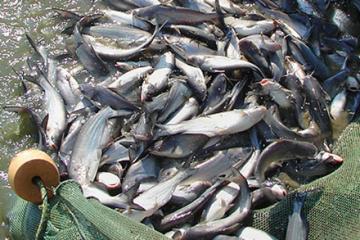
Season 6: Aquaculture
Episode 1: Bringing Seafood Closer to Home
Aquaculture, commonly known as fish farming, is a global multi-billion dollar industry, and is one of the fastest growing forms of food production. Unfortunately, most fish farming occurs overseas. ARS is helping the U.S. aquaculture industry provide more locally sourced seafood, including oysters, trout, salmon, catfish, and new varieties. In fact, you may soon be able to purchase seafood that was farm raised in your own city or town.
Listen now on: Apple Podcasts, iHeart Radio, Spotify, YouTube, mp3, and more.
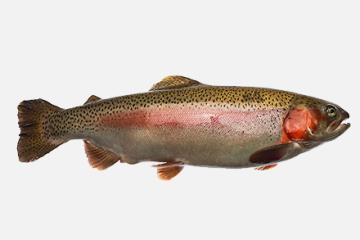
Season 6: Aquaculture
Episode 2: The Fastest Growing Fish You’ve Ever Seen
Fish farmers are using natural contained aquifers to grow fish to market size at an incredible fast rate. That’s because aquifers can provide optimal conditions for fish rearing. Unfortunately, you can’t scale-up aquifers. ARS researchers are working with fish farmers to develop and implement best management practices to increase fish yields, health, and size of fish reared in aquifers.
Listen now on: Apple Podcasts, iHeart Radio, Spotify, YouTube, mp3, and more.
Read more:
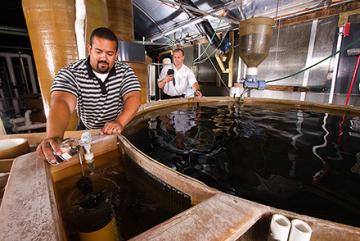
Season 6: Aquaculture
Episode 3: Farm Fishing Indoors
When you grow anything indoors, you can control a lot of the conditions, including temperature, irrigation, insect and disease resistance, and water quality and consumption. ARS researchers are using indoor recirculating systems to improve the health and yields of rainbow trout while maintaining great taste and market size.
Listen now on: Apple Podcasts, iHeart Radio, Spotify, YouTube, mp3, and more.
Read more:
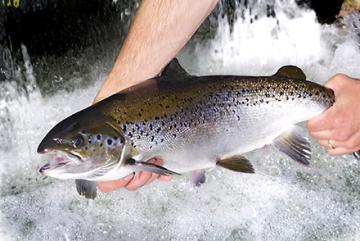
Season 6: Aquaculture
Episode 4: Taking on Atlantic Salmon’s Biggest Foe
Sea lice is a huge problem in the seafood business. Not only does sea lice cause physical harm, but it can also stress the fish out, which can then affect their growth rate and ability to fight off other diseases. I mean, how would you like a blood sucker attached to your skin all the time? There currently are no vaccines or effective treatments for sea lice. However, ARS researchers are working to develop an Atlantic salmon strain that is resistant to sea lice.
Read more:
Listen now on: Apple Podcasts, iHeart Radio, Spotify, YouTube, mp3, and more.
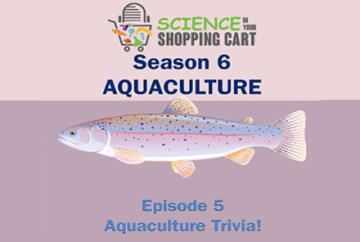
Season 6: Aquaculture
Episode 5: Aquaculture Trivia
Test your knowledge of aquaculture and learn some interesting facts.
Listen now on: Apple Podcasts, iHeart Radio, Spotify, YouTube, mp3, and more.
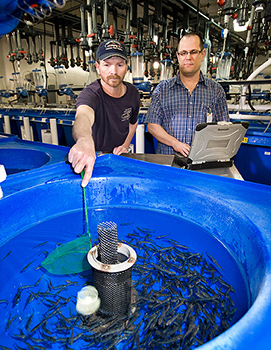
Season 6: Aquaculture
Episode 6: Water Conservation in Indoor Systems
Take a tour of an indoor recirculating system in Shepherdstown, West Virginia and learn how ARS researchers are using less fresh water while keeping optimal performance for fish rearing.
Listen now on: Apple Podcasts, iHeart Radio, Spotify, YouTube, mp3, and more.
Read more:
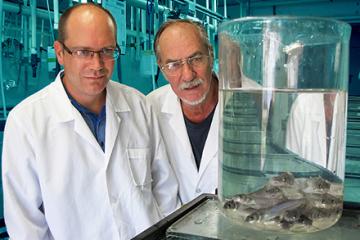
Season 6: Aquaculture
Episode 7: How Do You Fight Fish Disease?
A healthy fish is a happy fish! ARS researchers are fighting fish diseases by developing vaccines, breeding fish strains that are resistant to select diseases, and providing guidance to the industry of best practices for keeping their fish healthy.
Listen now on: Apple Podcasts, iHeart Radio, Spotify, YouTube, mp3, and more.
Read more:
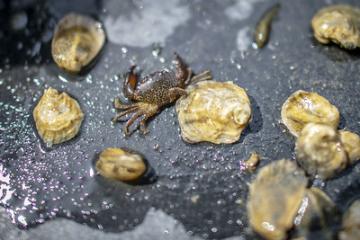
Season 6: Aquaculture
Episode 8: East Coast Shellfish Represent!
An East Coast perspective on how important shellfish are to our agriculture ecosystem and how their sustainability and low environmental impact makes the shellfish market the wave of the future.
Listen now on: Apple Podcasts, iHeart Radio, Spotify, YouTube, mp3, and more.
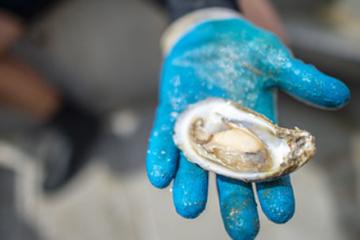
Season 6: Aquaculture
Episode 9: West Coast Shellfish Represent!
Learn how ARS scientists are working with Oregon State University to produce new strains of the Pacific Oyster and protect them from a serious disease that’s recently been invading our waters.
Listen now on: Apple Podcasts, iHeart Radio, Spotify, YouTube, mp3, and more.
Read more:
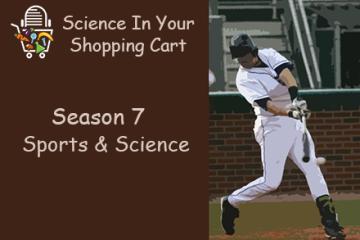
Season 7: Sports and Science
Every part of a sport, from the clothing to the equipment, even to the playing field, has been enhanced by science. In this podcast, we look at how agricultural science has impacted sports, like how hydration can affect an athlete, not only physically but psychologically; and how nanoparticles can help uniforms control sweat and odor. We’ll also look at improved natural grasses for playing fields, and how enhancing the process for making leather materials results in better quality sports gloves. And we’ll talk with a nutrition expert about how to keep your body in top shape for athletics.
Listen now on: (70 mins) Apple Podcasts, iHeart Radio, Spotify, YouTube, mp3, and more.
Don't have time to listen to the entire podcast? Explore the individual segments below.
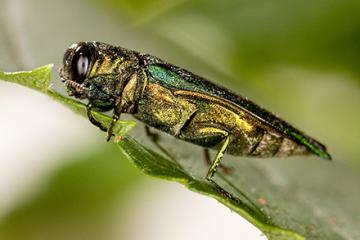
Season 7: Sports and Science
Episode 1: Batter Up
Baseball has been around for nearly 150 years, and in that time, we’ve seen plenty of home run sluggers, from Babe Ruth and Hank Aaron to Alex Rodriguez and Ken Griffey, Jr., to today's mashers like Aaron Judge and Mike Trout.
Did you know that most professional baseball bats are made from either maple or ash? ARS researchers help keep America’s pastime swinging for the fences by protecting ash trees from the emerald ash borer.
Listen now on: Apple Podcasts, iHeart Radio, Spotify, YouTube, mp3,and more.
Read more:

Season 7: Sports and Science
Episode 2: Stay Hydrated
Dehydration has long been known to compromise physical performance. At the Jean Mayer USDA Human Nutrition Research Center on Aging at Tufts University researchers explored the effects of dehydration on cognition—the ability to use information to function—and mood.
Listen now on: Apple Podcasts, iHeart Radio, Spotify, YouTube, mp3, and more.
Read more:
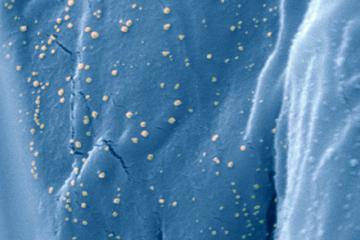
Season 7: Sports and Science
Episode 3: Taking the Smell Out of Sports
Nanoparticles help protect your body from germs and other microbials, it also fights body odor, especially from sweating. ARS researchers have figured out a better way for attaching nanoparticles to clothing.
Listen now on: Apple Podcasts, iHeart Radio, Spotify, YouTube, mp3, and more.
Read more:
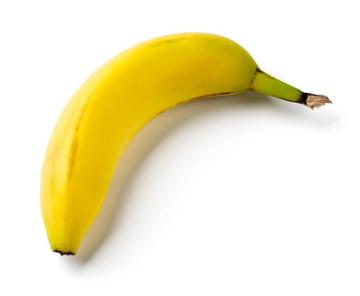
Season 7: Sports and Science
Episode 4: True or False About Nutrition
Are apples good for you to eat before or during an athletic event? How about bananas? When should you consume sports drinks? In this segment, registered dietitian Wendy Shaw will confirm or dispel some common myths about eating and drinking certain foods before, during and after athletic events.
Listen now on: Apple Podcasts, iHeart Radio, Spotify, YouTube, mp3, and more.
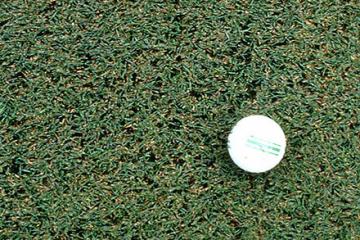
Season 7: Sports and Science
Episode 5: Turf Battles
Did you know ARS has been developing natural turf cultivars since the 1940s? This has led to improved playing surfaces on golf courses all across the country.
Listen now on: Apple Podcasts, iHeart Radio, Spotify, YouTube, mp3, and more.
Read more:

Season 7: Sports and Science
Episode 6: Good Leather
The leather industry in the United States, while not as prosperous as in days past, is still a significant market in textiles, clothing, and sports. ARS researchers have answered the bell time and time again over the years to make leather processing safer, more efficient, and more profitable.
Listen now on: Apple Podcasts, iHeart Radio, Spotify, YouTube, mp3, and more.
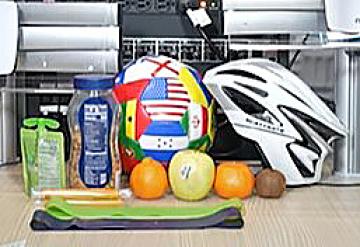
Season 7: Sports and Science
Episode 7: Nutrition is Part of Training Too
In the final part of our podcast on Sports & Science, Wendy Shaw, a registered dietitian formerly with the National Agricultural Library, discusses the importance of nutrition, from the world’s elite athletes to the weekend warriors.
Listen now on: Apple Podcasts, iHeart Radio, Spotify, YouTube, mp3, and more.
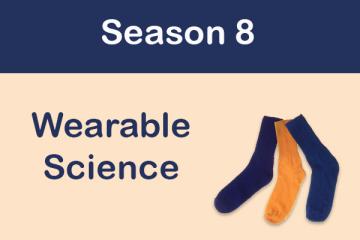
Season 8: Wearable Science
Americans spend millions, maybe billions, on clothes every year. It's a huge industry. When you think about clothes, do the words style, fit, and comfort come to mind? How about science and technology? Probably not, but science and technology play a major role in the textile industry.
Listen now on: (14 min. 18 sec.) Apple Podcasts, iHeart Radio, Spotify, YouTube, mp3, and more.
Don't have time to listen to the entire podcast? Explore the individual segments below.
Season 8: Wearable Science
Episode 1: COVID-Busting Clothing
Learn how ARS researchers in New Orleans are finding innovative ways to enhance masks, clothing, and other wearable materials that help protect against coronavirus.
Listen now on: Apple Podcasts, iHeart Radio, Spotify, YouTube, mp3, and more.
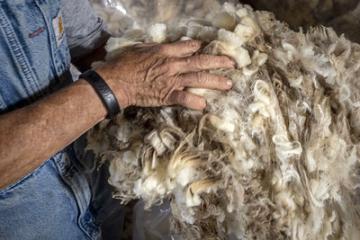
Season 8: Wearable Science
Episode 2: Getting Cozy with Wool
Did you know that many of the advancements in wool and leather clothing were developed in Wyndmoor, PA, including a technique to get rid of the yellowing of wool?
Listen now on: Apple Podcasts, iHeart Radio, Spotify, YouTube, mp3, and more.
Read more:
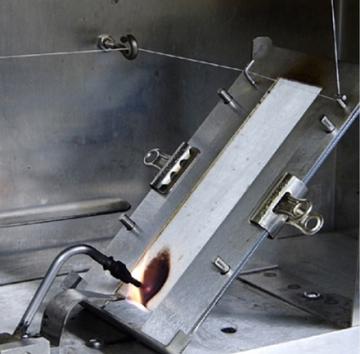
Season 8: Wearable Science
Episode 3: Turning Down the Flames
What if your clothes were naturally flame-retardant and durable enough to still be effective after multiple washes? Well, that's just what ARS researchers are striving for, and they may have achieved half their goal with this groundbreaking finding. Check out the podcast, then watch this cool video comparing fire-resistant cotton vs regular cotton in flammability testing.
Listen now on: Apple Podcasts, iHeart Radio, Spotify, YouTube, mp3, and more.
Read more:
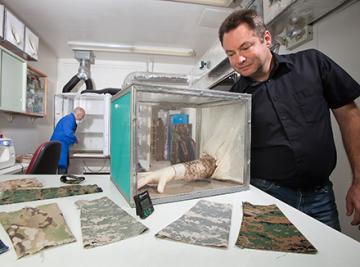
Season 8: Wearable Science
Episode 4: Preparing for Combat
ARS is showing its military might by developing insect repellant treatments that could be applied to service member uniforms to protect our brave men and women from a mighty and tiny enemy.
Listen now on: Apple Podcasts, iHeart Radio, Spotify, YouTube, mp3, and more.
Read more:
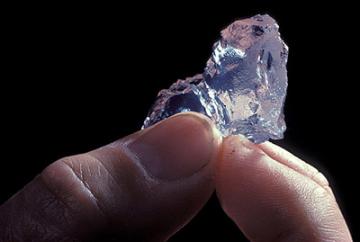
Season 8: Wearable Science
Episode 5: Breaktime
Jeans that don't scratch, insect repellents made from natural ingredients, and a Super Slurper? Check out these amazing breakthroughs.
Listen now on: Apple Podcasts, iHeart Radio, Spotify, YouTube, mp3, and more.
Read more:
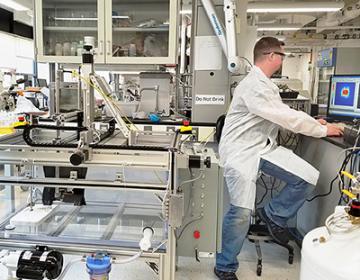
Season 8: Wearable Science
Episode 6: Spotting a Good Hide
Get the inside story of how ARS researchers created an automated, objective method for detecting imperfections on a hide; a method that greatly benefits U.S. leather producers.
Listen now on: Apple Podcasts, iHeart Radio, Spotify, YouTube, mp3, and more.
Season 8: Wearable Science
Episode 7: Back to the Future with Hemp
Is hemp the plant of the future? See if this crop, that has been around for thousands of years, will find its place in the U.S. agricultural market place.
Listen now on: Apple Podcasts, iHeart Radio, Spotify, YouTube, mp3, and more.
Read more:
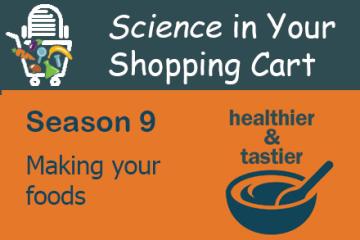
Season 9: Healthier & Tastier
Here at ARS, we love food as much as you do, and we’re also conscious of making healthy food choices. That’s why in this season we’re going to show you a trio of new peaches, healthier margarines, new beer hops, tasty and healthy wraps, and even, get this, a self-fertilizing almond.
Listen now on: (14 min. 18 sec.) Apple Podcasts, iHeart Radio, Spotify, YouTube, mp3, and more.
Don't have time to listen to the entire podcast? Explore the individual segments below.

Season 9: Healthier & Tastier
Episode 1: A Healthier Milk Chocolate
The U.S. imports around $5 billion in cocoa and chocolate products annually, and we produce millions of pounds of chocolate for consumers. The health benefits of dark chocolate are well known, mainly it has more antioxidants than milk chocolate because it contains more cacao solids. But dark chocolate can be brittle and taste bitter. What if we could make milk chocolate as healthy as dark chocolate, without sacrificing taste? And what if we could do it by adding a low value agricultural byproduct, such as peanut skins?
Listen now on: Apple Podcasts, iHeart Radio, Spotify, YouTube, mp3, and more.
Read more:
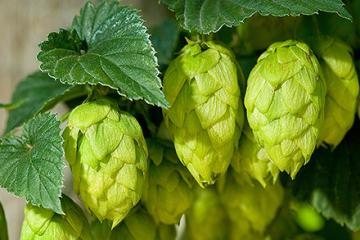
Season 9: Healthier & Tastier
Episode 2: Cheers to a Hearty New Hop
We’re traveling to Corvallis, Oregon, to meet with ARS research geneticist John Henning at the Forage Seed and Cereal Research Unit, where he and his team released two new beer hop varieties: Vista and Triumph.
Listen now on: Apple Podcasts, iHeart Radio, Spotify, YouTube, mp3, and more.
Read more:

Season 9: Healthier & Tastier
Episode 3: These Peaches are a Real Joy
We travel to Byron, Georgia, to the ARS Fruit and Tree Nut Research Unit, and visit with Research Horticulturist Chunxian Chen. Dr. Chen and his group recently released three new peach cultivars: Rich Joy, Crimson Joy, and Liberty Joy.
Listen now on: Apple Podcasts, iHeart Radio, Spotify, YouTube, mp3, and more.
Read more:
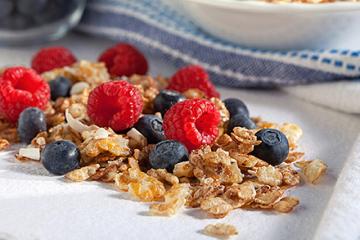
Season 9: Healthier & Tastier
Episode 4: Breaktime: Getting Healthy
Here at ARS, we are constantly researching ways to make the food in your shopping cart healthier and tastier, including for those who have to be careful about the food they ingest. Here are some recent creations that will get your mouth watering.
Listen now on: Apple Podcasts, iHeart Radio, Spotify, YouTube, mp3, and more.
Read more:
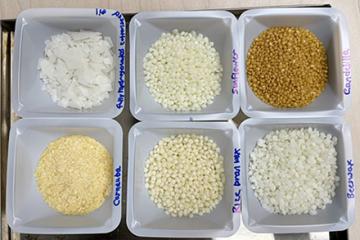
Season 9: Healthier & Tastier
Episode 5: Waxing Poetic About Healthy Oils
Wouldn’t it abe great if the oils and margarines you cook with were healthy for you while still enhancing the flavor of your foods? ARS researchers are mixing common cooking oils with natural waxes to create oleogels – which you can say is the secret sauce behind a healthier cooking oil.
Listen now on: Apple Podcasts, iHeart Radio, Spotify, YouTube, mp3, and more.
Read more:
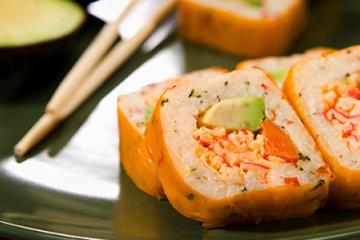
Season 9: Healthier & Tastier
Episode 6: Wrapping Up More Flavor
ARS food technologist Tara McHugh may be the GOAT when it comes to creating foods that are both healthy and tasty. Dr. McHugh and her team have a created a variety of delicious treats and eats, but perhaps her signature creation was a wrap made from fruits and vegetables.
Listen now on: Apple Podcasts, iHeart Radio, Spotify, YouTube, mp3, and more.
Read more:
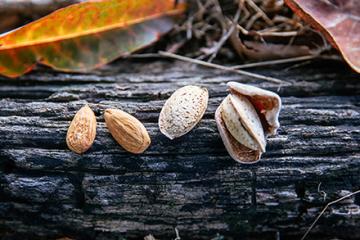
Season 9: Healthier & Tastier
Episode 7: Move Over Bees, This Almond Pollinates Itself
Yorizane is the first self-pollinating almond in the U.S., and it has the traits industry and consumers are looking for. It won’t be long before these delicious nuts are ready for your shopping cart
Listen now on: Apple Podcasts, iHeart Radio, Spotify, YouTube, mp3, and more.
Read more:
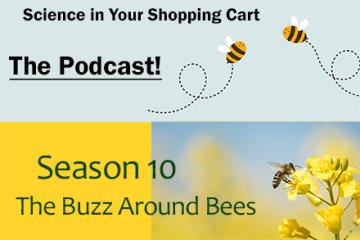
Season 10: The Buzz Around Bees
This season we are talking about bees. Bees are essential to healthy, biodiverse ecosystems. Commercial production of many high-value and specialty crops like almonds and other tree nuts, berries, fruits and vegetables depend on pollination.
Listen now on: (1hr. 46 min.) Apple Podcasts, iHeart Radio, Spotify, YouTube, mp3, and more.
Don't have time to listen to the entire podcast? Explore the individual segments below.
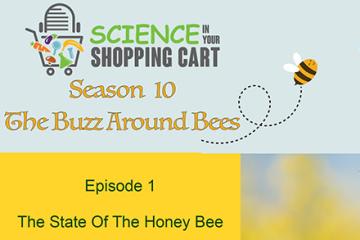
Season 10: The Buzz Around Bees
Episode 1: The State of the Honey Bee
Are honey bees dying at an alarming rate? What are their biggest threats? How resilient are they? We sat down with one of the world's leading honey bee experts, ARS entomologist Jay Evans to discuss the state of honey bee populations.
Listen now on: Apple Podcasts, iHeart Radio, Spotify, YouTube, mp3, and more.
Read more:
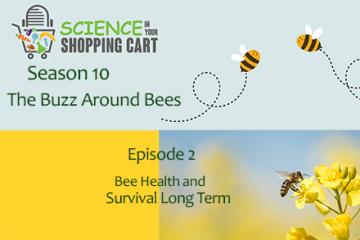
Season 10: The Buzz Around Bees
Episode 2: Bee Health And Survival Long Term
Take a trip with us to ARS’s Invasive Species and Pollinator Health Unit in Albany, CA, where researchers are looking at long-term factors affecting bee health and colony survival. They want to better understand how factors such as nutrition, pesticides, extreme weather, and natural events impact colony performance and sustainability over multiple seasons.
Listen now on: Apple Podcasts, iHeart Radio, Spotify, YouTube, mp3, and more.
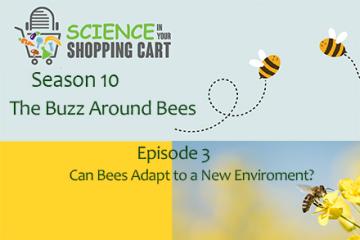
Season 10: The Buzz Around Bees
Episode 3: Can Bees Adapt to a New Environment?
Today, bees and other pollinators are facing many pressing issues, either directly related or amplified by extreme weather conditions and new weather patterns. And the big question is, can they adapt to these ever evolving conditions?
Listen now on: Apple Podcasts, iHeart Radio, Spotify, YouTube, and more.
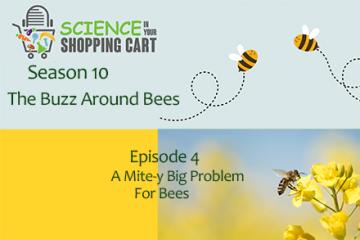
Season 10: The Buzz Around Bees
Episode 4: A Mite-y Big Problem for Bees
The varroa mite is one of the biggest threats to honey bees around the world. Essentially, it’s a modern honey bee plague. Varroa is an invasive species that originated in Asia. Learn what ARS researchers are doing to protect honey bees from varroa mites.
Listen now on: Apple Podcasts, iHeart Radio, Spotify, YouTube, mp3, and more.
Read more:
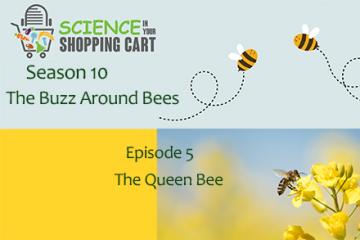
Season 10: The Buzz Around Bees
Episode 5: The Queen Bee
Being the queen bee may have its perks, but there’s a lot of stress to the job. Sure, you have worker bees bringing you food, grooming you, and caring for your babies. But you are responsible for the livelihood of your children – not just 3 or 4 or 5 babies but tens of thousands. That can put tremendous stress on anyone, queen bees included. ARS researcher, Mohamed Alburaki explains what it is like to be the queen bee.
Listen now on: Apple Podcasts, iHeart Radio, Spotify, YouTube, mp3, and more.
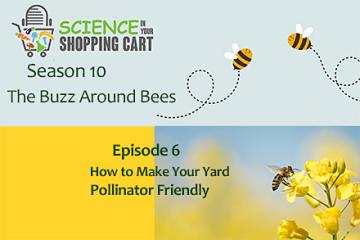
Season 10: The Buzz Around Bees
Episode 6: Breaktime - How to Make Your Yard Pollinator Friendly
Pollinators are essential to healthy, biodiverse ecosystems. Bee experts Liz Walsh and Lanie Bilodeau offer tips for making your home yards more bee friendly.
Listen now on: Apple Podcasts, iHeart Radio, Spotify, YouTube, mp3, and more.
Learn more:
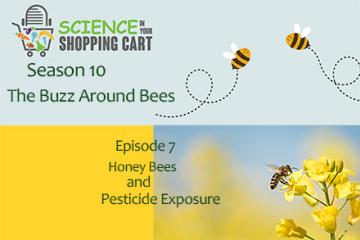
Season 10: The Buzz Around Bees
Episode 7: Honeybees and Pesticide Exposure
Pesticides are an important tool for managing hungry and destructive insects and invasive species. But there is little known how pesticides affect the bees that pollinate our crops. ARS entomologist Julia Fine discusses how exposure to different pesticides may affect honey bee behaviors.
Listen now on: Apple Podcasts, iHeart Radio, Spotify, YouTube, mp3, and more.
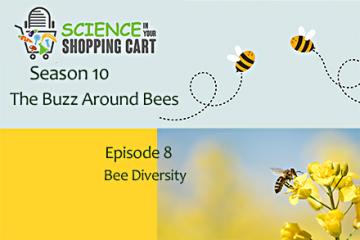
Season 10: The Buzz Around Bees
Episode 8: Bee Diversity
How many different types of bees can you think of? Bumble bees, honey bees, mason bees. There’s actually a lot more bee diversity than you think, a lot more. Find out about the different types of bees and their need for diversity for survival, with Dr. Diana Cox-Foster, research leader at the Pollinating Insect-Biology, Management, Systematics Research Unit in Logan, UT.
Listen now on: Apple Podcasts, iHeart Radio, Spotify, YouTube, mp3, and more.
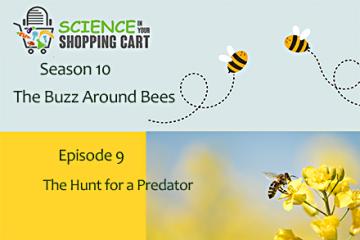
Season 10: The Buzz Around Bees
Episode 9: The Hunt for a Predator
Join us at the National Museum of Natural History in Washington, D.C., where we talk with ARS researcher Matthew Buffington, who explains how a deadly predator to the honey bee recently arrived in the U.S. Is the Norther Giant Hornet still a threat to our precious honey bee population?
Listen now on: Apple Podcasts, iHeart Radio, Spotify, YouTube, mp3, and more.
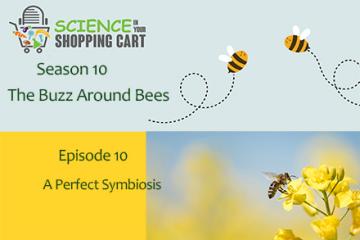
Season 10: The Buzz Around Bees
Episode 10: A Perfect Symbiosis
ARS research entomologist Shawn Steffan works in cranberry country, USA — aka Madison, WI. Here, bees are vital to cranberry production, so keeping them healthy and happy are crucial. Steffan is studying the relationship between bees, their microbiome, and the environment in which they live and work. Listen to learn how building a perfect symbiosis may be the key to long-term health of honey bees.
Listen now on: Apple Podcasts, iHeart Radio, Spotify, YouTube, mp3, and more.
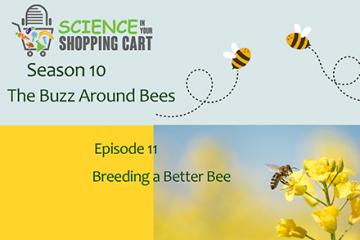
Season 10: The Buzz Around Bees
Episode 11: Breeding a Better Bee
Humans have been breeding honey bees for centuries to help them adapt to new environments, and with technology improving at a rapid pace, breeders may now have the tools to "build" a perfect bee. Join us at the Honey Bee Lab in Baton Rouge, LA, where bee experts discuss the challenging and exciting art of bee breeding.
Listen now on: Apple Podcasts, iHeart Radio, Spotify, YouTube, mp3, and more.
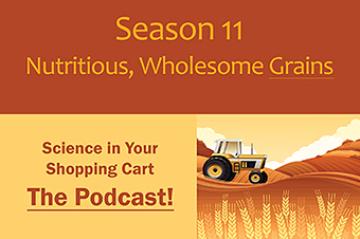
Season 11: Wholesome, Nutritious Grains
This season we are talking about grains. Grains are the edible seeds of cereal crops such as wheat, rice, barley, oats and corn. Substituting whole-grain foods for refined-grain products like white bread in your diet can be a healthy choice. Unlike refined grains, which undergo extensive milling or other processing, whole grains are sold for eating with their bran and other constituents intact—all rich in vitamins, minerals, fiber and other nutrients.
Listen now on: (109 min. 39 sec.) Apple Podcasts, iHeart Radio, Spotify, YouTube, mp3, and more.
Don't have time to listen to the entire podcast? Explore the individual segments below.
Check Out Our Other Episodes on Grains
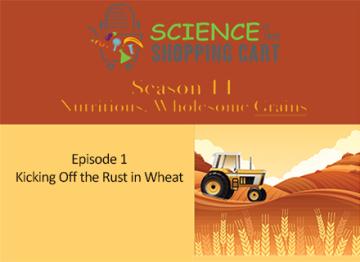
Season 11: Wholesome, Nutritious Grains
Episode 1: Kicking Off the Rust in Wheat
Wheat is a big crop in the United States. Stripe rust is one of the most important diseases for wheat. ARS plant pathlogist Xianming Chen and researchers with ARS’s Wheat Health, Genetics, and Quality Research Unit in Pullman Washington are testing and developing new varieties of wheat that are resistant to the crop's major disease threats, including stripe rust.
Listen now on: Apple Podcasts, iHeart Radio, Spotify, YouTube, mp3, and more.

Season 11: Wholesome, Nutritious Grains
Episode 2: Shucking A Nasty Fungus
Corn is grown all over our planet and is an important crop in all parts of our lives. ARS Research Entomologist Xinzhi Ni, at ARS’s Crop Genetics and Breeding Research Unit in Tifton, GA, is looking at how corn plants get stressed, and how those stressors invite diseases and pathogens to proliferate inside the crop. Ni is hopeful the work will help future entomologists and breeders find solutions to these perennial problems.
Listen now on: Apple Podcasts, iHeart Radio, Spotify, YouTube, mp3, and more.
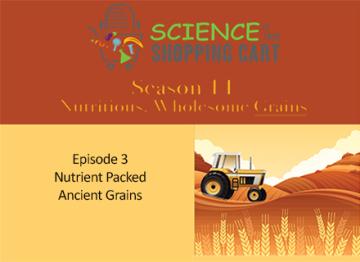
Season 11: Wholesome, Nutritious Grains
Episode 3: Nutrient Packed Ancient Grains
The term "ancient grains" refers to a category of grains — particularly pseudo-cereals — that provide essential nutritional requirements for our health. ARS food scientist Sean Liu at the ARS Functional Foods Research Unit in Peoria, Illinois is researching ways to make ancient grains more nutritional and more attractive to consumers.
Listen now on: Apple Podcasts, iHeart Radio, Spotify, YouTube, mp3, and more.
Read more:
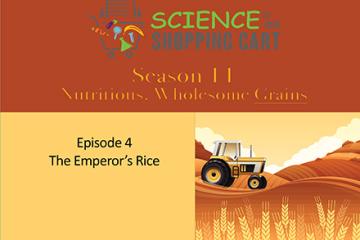
Season 11: Wholesome, Nutritious Grains
Episode 4: The Emperor’s Rice
At the Dale Bumpers National Rice Research Center in Stuttgart, Arkansas, ARS geneticist Shannon Pinson studies specialty rice that is beneficial to human health. Her work includes research on colored rice that has traditionally been given to pregnant women for the nutritional benefits it provides during pregnancy.
Listen now on: Apple Podcasts, iHeart Radio, Spotify, YouTube, and more.
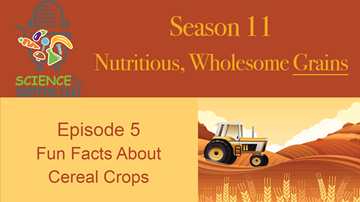
Season 11: Wholesome, Nutritious Grains
Episode 5: Fun Facts About Cereal Crops
ARS researchers have developed and strengthened our food supply. Listen to learn some fun facts about cereal crops and other foods that can enhance your diet.
Listen now on: Apple Podcasts, iHeart Radio, Spotify, YouTube, and more.
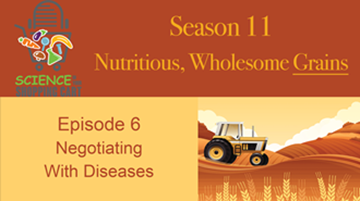
Season 11: Wholesome, Nutritious Grains
Episode 6: Negotiating With Diseases
ARS research leader Shahryar Kianian and his colleagues at ARS’s Cereal Disease Lab in St. Paul, MN are leaning on the art of negotiation to help oat producers deal with a deadly disease, called Crowned Rust.
Listen and learn how ARS is protecting oats, some of the healthiest grains you can put in your body. They are a great source of fiber, and they contain lots of vitamins and minerals, as well as antioxidants.
Listen now on: Apple Podcasts, iHeart Radio, Spotify, YouTube, and more.
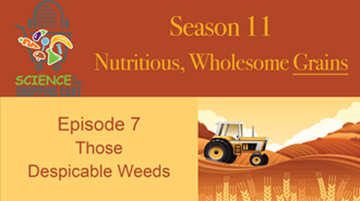
Season 11: Wholesome, Nutritious Grains
Episode 7: Those Despicable Weeds
ARS Ecologist, Martin Williams at ARS’s Global Change and Photosynthesis Unit in Urbana, IL is researching ways to help farmers to deal with their weeds. Williams’ research is aimed at ways to control those pesky weeds and manage their crops.
Listen now on: Apple Podcasts, iHeart Radio, Spotify, YouTube, and more.
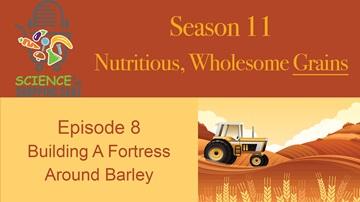
Season 11: Wholesome, Nutritious Grains
Episode 8: Building A Fortress Around Barley
ARS Research Geneticist, Dr. Dolores Mornhinweg at the Peanut and Small Grains Research Unit in Stillwater, OK is developing new Barley crop lines that are resistant to pests such as the Russian Wheat Aphid.
Barley is an important part of the U.S. economy, bringing in over a billions dollars in crop value. The Russian Wheat Aphid is a major pest to barley production in the U.S.
Listen now on: Apple Podcasts, iHeart Radio, Spotify, YouTube, and more.
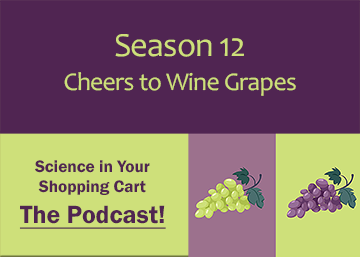
Season 12: Cheers to Wine Grapes
ARS researchers make sure the science, chemistry, and math all add up to great wine grape production across the U.S. Learn about ARS’s crucial roles in wine grape production as our researchers’ find answers to the biggest problems facing the nation’s wine grape industry. For this season of Science in Your Shopping Cart, we’re hitting the virtual wine trail to learn the science behind wine grape growing and how everything in our environment, including wildfires, can influence the characteristics that pour into a glass of wine.
Listen now on: (88 min. 56 sec.) Apple Podcasts, iHeart Radio, Spotify, YouTube, mp3, and more.
Don't have time to listen to the entire podcast? Explore the individual segments below.
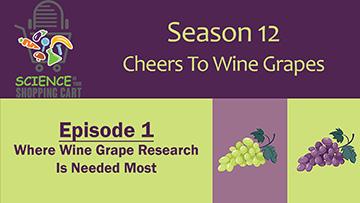
Season 12: Cheers to Wine Grapes
Episode 1: Where Wine Grape Research Is Needed Most
ARS researchers work with the National Grape Research Alliance (NGRA) to initiate novel research projects and programs to solve industry challenges. And there’s no bigger challenge today than dealing with extreme weather and shifting weather patterns.
Thankfully, ARS researchers are on the job, working with the NGRA to solve problems and find solutions in the areas that grape research is needed most.
Listen now on: Apple Podcasts, iHeart Radio, Spotify, YouTube, mp3, and more.
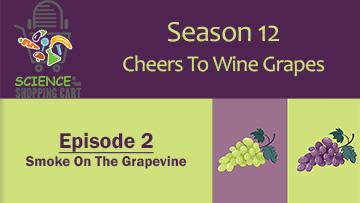
Season 12: Cheers to Wine Grapes
Episode 2: Smoke On the Grapevine
ARS researcher Arran Rumbaugh, a research chemist at the Crops Pathology and Genetics Research Unit in Davis, CA, is studying how smoke from wildfires can affect the chemical composition of wine grapes.
Wildfires from 2020 hurt wine grape production and had an estimated 3.7 billion dollars of economic impact on the wine industry due to smoke exposure and fire. Dr. Rumbaugh is working on an early screening method that could quickly detect the smoke exposure and impact on grapevines. This ARS research has the potential to save time, money, and millions of wine grapes.
Click here to learn more about Arran Rumbaugh’s research.
Listen now on: Apple Podcasts, iHeart Radio, Spotify, YouTube, mp3, and more.
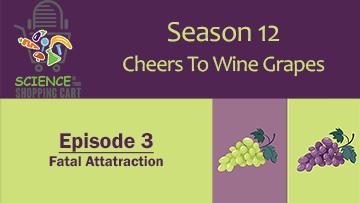
Season 12: Cheers to Wine Grapes
Episode 3: Fatal Attraction
Meet ARS researcher Jacob Corcoran, a research molecular biologist at ARS’s Biological Control of Insects Unit in Columbia, MO. Corcoran and his team are working on a new age, next generation approach to biological control to slow down the reproductive process to protect wine vineyards from dreaded vine mealybugs.
Listen now on: Apple Podcasts, iHeart Radio, Spotify, YouTube, mp3, and more.
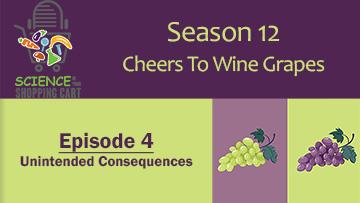
Season 12: Cheers to Wine Grapes
Episode 4: Unintended Consequences
ARS researchers are working with the National Grape Research Alliance (NGRA) to help wine grape growers adapt to ever-evolving weather patterns as well as extreme weather conditions. Believe it or not, it may not be all bad. One of the unintended consequences of shifting weather patterns is the ability of certain regions to produce grape varieties they’ve never been able to grow before. This is also creating a resurgence of grape production in areas that were once prominent for wine growing.
Listen now on: Apple Podcasts, iHeart Radio, Spotify, YouTube, mp3, and more.

Season 12: Cheers to Wine Grapes
Episode 5: Managing Vineyards From Space
ARS researcher Bill Kustas, a Research Hydrologist and Distinguished Senior Research Scientist at ARS’s Hydrology and Remote Sensing Laboratory in Beltsville, MD, is part of a collaborative team called GRAPEX. The GRAPEX research program involves using satellites and even unoccupied aerial vehicles to identify vine water use and stress throughout a vineyard. Growers can use these data to determine if certain areas are getting too much, too little, or just the right amount of irrigated water.
Listen now on: Apple Podcasts, iHeart Radio, Spotify, YouTube, mp3, and more.
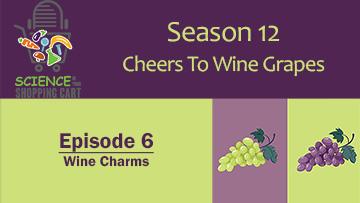
Season 12: Cheers to Wine Grapes
Episode 6: Wine Charms
The USDA’s Agricultural Research Service (ARS) protects and helps the wine industry thrive in the United States. Learn some fun facts to share at your next wine tasting including the birthplace of American wine.
Listen now on: Apple Podcasts, iHeart Radio, Spotify, YouTube, mp3, and more.
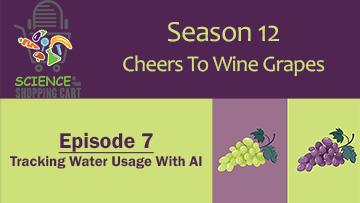
Season 12: Cheers to Wine Grapes
Episode 7: Tracking Water Usage With AI
ARS researcher Bradley King, a research agricultural engineer at ARS’s Northwest Irrigation and Soils Research lab in Kimberly, ID, is utilizing AI technology to help wine growers determine the best times to water their vineyards. King and his colleagues developed a validated, automated model that uses artificial intelligence to remotely calculate the daily crop water stress index, so wine growers know when to water their vines, and how much, to achieve maximum results for great tasting wine.
Listen now on: Apple Podcasts, iHeart Radio, Spotify, YouTube, mp3, and more.
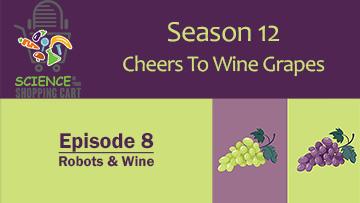
Season 12: Cheers to Wine Grapes
Episode 8: Robots & Wine
ARS researcher Lance Cadle-Davidson, a research plant pathologist at ARS’s Grape Genetics Research Unit in the finger lakes region in Geneva, NY, is helping protect wine vineyards that produce European style wines in the U.S. Cadle-Davidson and his team have created an automated process utilizing high resolution cameras with illumination to see fungal disease easily from LED lighting with artificial intelligence to quantify disease and robotics that capture images quickly in an automated system that speeds up the process of detecting and treating disease to keep wine growers one step ahead of deadly pathogens in upstate New York.
Check out the Blackbird robot in action at the link below.
• ARS Blackbird Robot In Action
Listen now on: Apple Podcasts, iHeart Radio, Spotify, YouTube, mp3, and more.
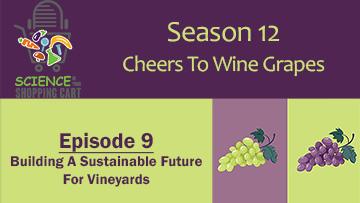
Season 12: Cheers to Wine Grapes
Episode 9: Building A Sustainable Future for Vineyards
ARS researcher Kerri Steenwerth, a research soil scientist with the Crops Pathology and Genetics Research Unit in Davis, CA, battles weather extremes and ways to keep wine grape growers ahead of the environmental curve.
Her research involves regenerative viticulture practices, which is similar to regenerative farming, or farming with sustainability and the environment in mind. Regenerative farming focuses on building and sustaining healthy soil, and it’s not a new practice; it’s been adopted by most wine growers for decades.
Listen now on: Apple Podcasts, iHeart Radio, Spotify, YouTube, mp3, and more.
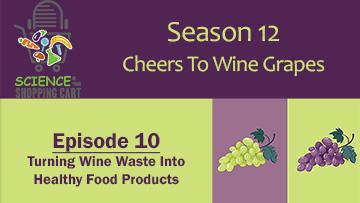
Season 12: Cheers to Wine Grapes
Episode 10: Turning Wine Waste Into Healthy Food Products
ARS researchers Nancy Keim and Wally Yokoyama are looking to turn wine waste – mainly pomace or what the researchers call marcs – into healthy food products that end up in our shopping carts.
Keim is studying the health benefits of combinations of chardonnay grape pomace and chardonnay grape extract. As expected, the enriched flour is high in fiber and has a lot of bioactive material, which means it will react favorably with organs, tissues, or cells in the human body. How this material interacts with the gut microbiome could be key to seeing these nutrients translate into actual health benefits.
While Keim is looking at the health benefits of white grape pomace, Yokoyama is studying the health benefits of waste from red wine grapes. Red wine grapes are high in polyphenols, which are compounds found in plants that act as antioxidants and have anti-inflammatory properties. Polyphenols have been linked to lowering cholesterol and protecting against certain diseases such as cardiovascular disease, diabetes, and certain cancers. But Yokoyama is studying whether polyphenols from red grapes can reduce the risk of neurodegenerative diseases like Alzheimer’s and dementia.
Listen now on: Apple Podcasts, iHeart Radio, Spotify, YouTube, mp3, and more.
To learn even more, check out our "Science in Your Shopping Cart" factsheets to discover more ARS research sitting in your shopping cart!



